Beyond infighting: Cultivating movements driven by love for people rather than hatred for capitalism
Unity of fields- How can we rise above our egos & internal divisions?
This is Part II of the Unity of Fields series by me (AK) & Aisha Abu-Asaba (AA). If you haven’t already, you can read part I here:
Dear friends,
From Tongva land (LA) to Palestine, the land is ablaze & crying out in anguish, begging for us to wake up, & pull ourselves together. Can you hear it?
From heat waves, droughts & wildfires to snow storms, hurricanes, floods & pandemics— there is nothing “natural” about these increasingly common disasters. One thing is clear— WE are all that we have. Only we can save us.
In LA, mutual aid collectives are helping displaced folks, coordinating food, water, supply distribution, sheltering animals, & tending to each other’s wounds. Meanwhile, the state is carrying out ICE raids & arresting unhoused people en masse. Insurance companies profit by denying coverage to people who lost their homes as real estate moguls try to buy out historic Black & Brown neighborhoods that burned to the ground.
The state will continue to fail us. We have a responsibility to ourselves & each other to do everything that we can to build, grow & sustain large-scale networks of community care. While small collectives are a first step, we need larger resistance movements to be able to put up a real fight against these empires. The same capitalist/ colonial systems driving horrific climate disasters, also stoke our egos which often get in the way of us building mass movements.
It is inspiring to see people come together to support each other during disasters. In the 2020 uprisings, people came together across the U.S after the police murder of George Floyd & in response to COVID-19. But, how much of that mass momentum was sustained till today? Many of these large-scale regional community networks DO NOT last for long. Why? Why does it take bigger disasters for people to come together & rise above any internal tensions?
What role can we, as individuals, play in the small political spaces we’re in to contribute to the growth of large-scale resistance movements? Those of us in the west and/or in relatively privileged positions— what are the major hurdles that keep getting in the way of us being more cohesive?
Our experience navigating leftist cancel culture in Nashville
In October 2023, a few of us came together to start an abolitionist, direct action focused, community organizing collective in Nashville. There was no local group at the time mobilizing for Palestine that people could join & build with. We wanted to lay foundations for people to connect dots between local & global struggles— from Turtle Island to Palestine.
There’s always a surge in momentum when long-standing atrocities grab more mainstream attention. Many relatively inexperienced people get a newfound urge to “do something”. So we went beyond sporadic protests to create a political home that people could anchor into, build community, grow their political consciousness, serve the most marginalized in our own backyards and build coalitions to lay the groundwork for larger movements. Lots of people joined soon after & made it what it is today— a beautiful, flawed, evolving organizing collective that tries to translate political ideas into actions in an effort to meet community needs (e.g. a mutual aid project with weekly nutritious food cooking/ distribution, regional crisis response teams, wound clinic, harm redux, cultural events, cross community teach-ins, etc).
Side note— Hi, it’s AK. I moved to Southern California in August so I’m not part of the Nashville-based collective anymore. While I miss the people, it makes me indescribably happy to know that the group is thriving, growing & building onwards since my departure.
Ironically, our collective’s toughest obstacle in 2023 and 2024 was not police/ state repression (though we did face lots of it), it was local leftists. The Nashville “radical political organizing scene” was our biggest source of distress. As our collective grew in visibility & faced hardships like state repression- instead of showing up for or with us, many leftists came for our throats.
While we didn’t expect to be besties with everyone, we tried to connect with folks across diverse contexts (including those who may be different but still aligned in our shared dedication to the struggle). Differences are inevitable. Sometimes they make us stronger & other times they can be navigated in a way that doesn’t harm the movement. Egos kill movements so we agreed to set ours aside.
Here’s a previous piece on carceral cancel culture on the western left which is often disguised as “accountability” when it’s really an extension of capitalism/ colonialism. Worth a read if you need more background.
How do we abolish the 'woke' cop in our head?
How can we hold people accountable in ways that we would like to be held accountable? How can we as communities practice justice in a way that doesn’t replicate the same cycles of violence that have been killing us thus far? What if accountability wasn’t scary? What if accountability was a sacred opportunity for us all to practice liberation?
How state/ police repression, cancel culture & relational conflict in organizing spaces are connected
In December 2023, three core members of our collective were arrested as a result of a targeted police sting operation. We planned a public demo at a mall to appeal to holiday shoppers. With advice from folks who organized similar successful actions in other cities, we had detailed safety plans, multiple strategies to adapt to the situation on the ground & didn’t plan to risk arrest. Regardless, before it started, we were ambushed, kettled & surrounded by ~100 cops who prevented us from leaving & came intending to arrest key members of our collective.
All the preparation in the world wouldn’t have mattered. Sometimes, sh*t like this happens & all we can do is stick together to navigate it. We were subject to police surveillance. One of us (AK) was specifically targeted and demonized as the main, dangerous, “outside agitator” & leader of our collective (that was founded & led by multiple people).
Sadly, it wasn’t just the police & state who leveraged that narrative…
After the arrests, we were subject to an exceedingly cruel, malicious, bullying & cancel campaign coordinated by a few ill-intentioned leftist organizers/ liberals. They fabricated lies, spread disinformation in local organizing spaces & deployed the same incendiary language the state uses to fear-monger, vilify & criminalize marginalized communities. They impeded coalition building efforts & “lobbied” people against us with hopes that we would be isolated & eventually exiled us from community.
Ironically, we did not know most of the people coming after us who claimed to have extensive, intimate knowledge of “harm” we’ve caused. At best, 1 person was an acquaintance some of us had been in a group with to plan 1 protest. We didn’t even recognize most names. Yet these people poured an exorbitant amount of time, energy & effort to try to destroy us. How is it that people who are supposedly committed to liberation can be so mean, callous & cut-throat towards others, who they may have never even met and certainly don’t know?
We expect the empire to come for us. But what happens when we come for us? What happens when we frame people within our movements as “enemies” simply because we dislike them or are different from them? We are shooting ourselves in the foot & making our communities more vulnerable than we already are to state violence, repression & infiltration.
We have to ask ourselves— WHY are we doing this? Why are we fighting for liberation? What motivates & drives us in this fight? To be free, we have to cultivate movements that are driven by our love for the people rather than by hatred for capitalism. When we’re driven by love, we can rise above our egos. But hate alone can misdirect us to tear each other down rather than the systems killing us all.
Different groups facing the same struggles
Our Nashville-based collective connected with groups in different cities to synchronize efforts. From Madison, New York, San Francisco, Seattle & Portland, to Hawaii, we observed eerily similar patterns— all groups shared stories of more radical groups being targeted by local leftists/ liberals while facing state repression. In all scenarios, there was no verified evidence to support the accusations being slung toward the collectives under fire. All groups were accused of committing “harm” or labeled as “unsafe” with no clear victims or incidents in question. It catalyzed widespread confusion, mistrust & fear in their respective communities, led to the collapse of coalitions that people worked hard to build and made it nearly impossible for different groups to work together again.
“I’m not alone”
[ The next section is written by AK in first person ]
Another pattern that came to light in our discussions with other groups was that specific people, most often women or femmes of color, were disproportionately targeted by leftist cancel campaigns. There was an odd fixation on select people who took on leadership roles.
While our group was targeted in general, I was at the center of most accusations & disproportionately subject to a cruel, disinformation-based, gossip & bullying campaign that lasted for over 10 months until my departure from Nashville (& continues in my absence). I was battling unprecedented state/ police/ institutional repression at the same time, navigating a tough immigration case (which is still pending), multiple health crises and trying to rise above the bs to focus on laying a foundation that others could build on long after I’m gone.
This work was never about me. Meanwhile, leftists operating in the shadows who I had never met or worked closely with accused me of being violent, an FBI/ police informant, an abuser with no victim or incident cited, etc. As a result, several people stopped working with me & banned me from accessing some spaces… despite the lack of evidence. These accusers went out of their way to try to cut me off from support in a time when I needed them most to survive. I held on to life by a thread during those months…
Shockingly, I realized I wasn’t alone. Since then I’ve talked to 43 organizers of color from across the United States (thus far) who had the SAME experience as me in 2023-2024. This will eventually be compiled into a report.
Some common patterns I observed— all 43 have a few years or more of organizing experience in various movements which was seen as a threat by some (29 of them focus on Palestine & global south issues), they have long-standing relationships across different communities, people look to them for strategic direction often, and 24 of them have relatively larger platforms as writers/ political educators/ movement historians etc (either anonymous or identifiable). Many of them are STILL stuck navigating the backlash of these carceral cancel campaigns.
Two of these 43 organizers were comfortable being named in this piece— Dr. Rupa Marya and Dr. Sang Hea Kil. They are both navigating eerily similar battles as I did in their respective local ecologies. Rupa is a Professor of Medicine suspended by UCSF and Sang is a Professor of Justice Studies suspended by SJSU for speaking up for Palestine. Rupa & I have grown closer over the last couple of years as fellow community organizers and abolitionists navigating colonial academic medicine and capitalist healthcare systems. I know & trust her deeply. We learn from each other, continue to grow, radicalize more & better understand our roles as community healers anchored into the struggle for liberation. Accountability has never been something either of us ran from even if we’re sometimes uncomfortable or afraid.
I think all 43 of us share the same pain in that it hurts when people within our movements come for us with baseless accusations, contempt & disdain. It hurts us MORE than when the state comes for us because we expect it to. But we expect people who claim to champion revolutionary values to act with kindness, dignity & integrity— including towards the people they may not like or get along with. If we cannot treat each other with a basic degree of respect and compassion then how exactly will we overthrow ruthless killing machines?
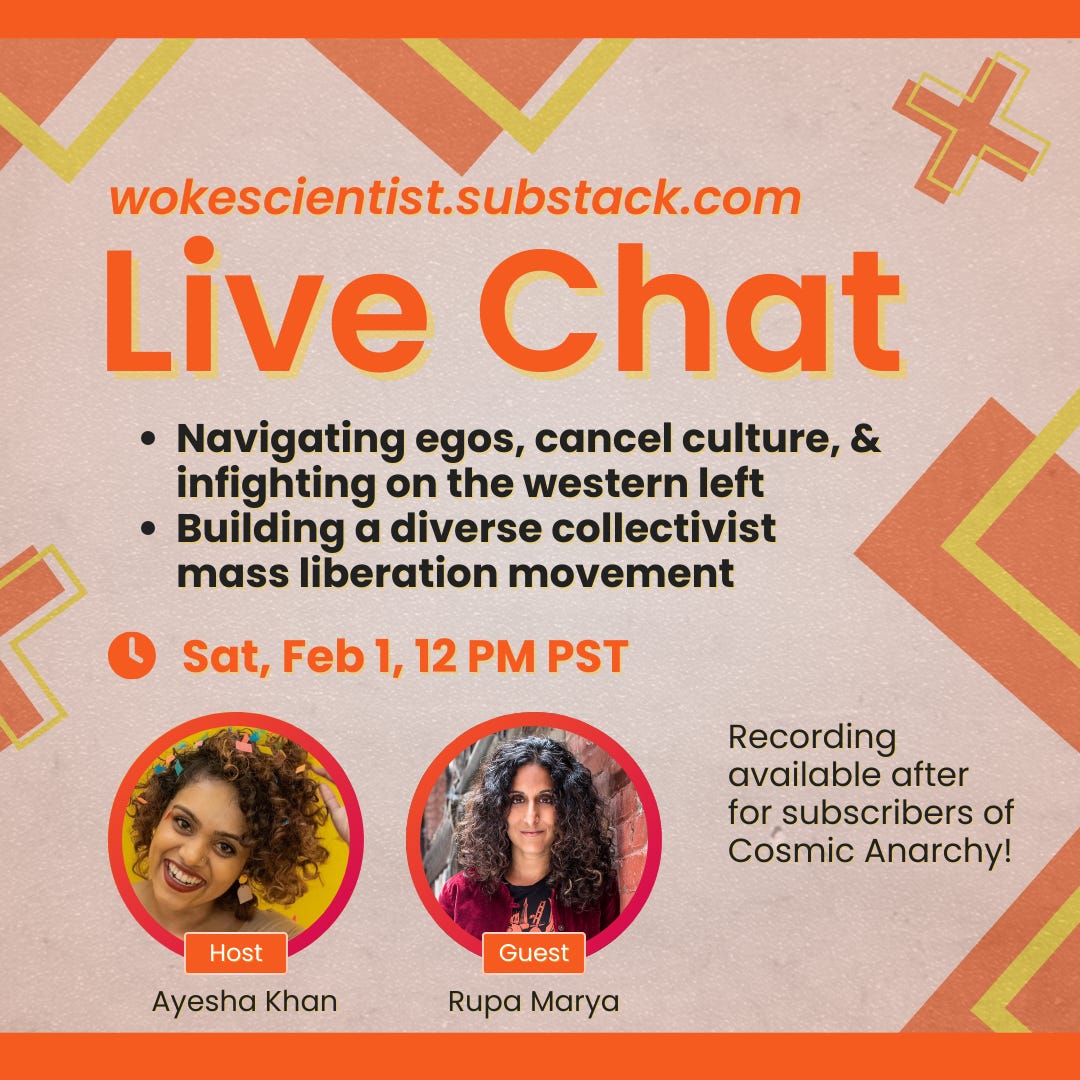
The state creates & exploits internal group divisions to destroy movements— past & present patterns
There are far too many historical examples that fit this pattern so we won’t list them all. But let’s start with a popular one.
In 1971, activists broke into FBI HQs and discovered files that confirmed suspicions that the state uses surveillance, infiltration & violence to combat radical political groups. COINTELPRO was an FBI program that aimed to disrupt, misdirect, discredit & ultimately neutralize radical groups in the 60s and 70s mobilizing for Black liberation, Puerto Rican independence, Indigenous sovereignty, socialism, etc.
The state/ FBI used the following techniques:
Surveillance, wire taps, tailing people, home/ office raids to create paranoia.
Exploiting internal group differences to spread disinformation, lies & sow confusion or division in the group’s ranks.
Targeting group leaders or key coordinators who seem to play instrumental roles in radical groups and intentionally spreading disinformation to discredit them and get people to mistrust & turn on them.
Arresting activists & leaders on trumped up charges, dragging them into long court trials to drain the group’s energy and resources, and heighten fear.
Send infiltrators to gather intelligence + plant provocateurs to instigate conflict, spread disinformation within & outside the group to disrupt it’s internal functioning and destabilize coalitions in general by pitting people or organizations in movements against each other.
Example: The divide between the East and West wings of the Black Panther Party was catalyzed by the FBI fabricating & spreading lies about some of each wings leaders (Huey Newton & Eldridge Cleaver).
Bad-jacketing or Fed-jacketing: Create suspicion within movements by fabricating evidence & spreading rumors that people (often in key positions within groups) are FBI and police informants.
Example: Anna Mae Aquash, a leader in the American Indian Movement (AIM), was kidnapped & murdered by other AIM members in 1976, after she was targeted in a movement wide slander campaign initiated by an FBI informant (Doug Durham) & then propagated by other disgruntled AIM members
The same techniques are widely deployed by the state today.
Technological advancements have increased the state’s reach, enhancing the destructive impact of repression on our movements & communities.
Why are people so driven to cancel each other?
State appointed informants & provocateurs have the same impact in our movements as ego-driven, bad faith actors operating WITHIN our communities. The only difference is that the latter are not on the state’s payroll, they’re doing it for free.
Our movements are filled with people who haven’t worked on unlearning internalized capitalism/ colonialism. That makes organizing a beautiful opportunity for growth if one is open to it. All of us are eternally working on this & there is no end point.
We are socialized by colonialism/ capitalism to see our kin as threats. Leftists behind baseless cancel campaigns want to prove their superiority & be seen as inherently better than others. They want to “win”, dominate & conquer those they perceive as “competition”. A lot of these actions are motivated by jealousy & envy. Experienced organizers are sometimes perceived as threats by younger folks & vice-versa. Keep in mind, everything we know today is because we learned it in community & from others. Everything we know came from somewhere.
Bottom line- egos kill movements. The state loves it when we act out of hatred rather than love for the people. The state wins when we fabricate lies about others simply because we dislike them.
A big reason carceral cancel culture is so pervasive in western leftist spaces might be because people are motivated by mutual hatred of capitalism rather than by love for people & the land. People are more focused on the systems they’re against rather than on the things they’re fighting for…
There have been plenty of conversations around Transformative Justice (TJ) as an accountability approach grounded in liberation rather than in carceral values. However, language around TJ is increasingly weaponized to further perpetuate cancel culture.
P.S. We’re not talking about instances involving real physical violence/ abuse/ assault/ sexual harassment etc.
What is the Unity of Fields?
The Palestinian resistance often references the concept of “Unity of Fields” which refers to the idea that all battlefields are connected and thus, must be coordinated. There is one common enemy (capitalist/ colonial empires) and to win, different, diverse fronts need to be cohesive in their efforts. Coordination does not mean hyper-centralization. If revolution is a wheel that turns, then there can be many different spokes on the wheel, all moving in one direction.
There are many fronts in the Palestinian struggle for liberation from Gaza to the West Bank and diverse factions that make up the Palestinian resistance but they move in unison. As Abdaljawad Omar explains in this piece on The Unity of Fields, the concept emerged from 100 years of Palestinian resistance against genocide, colonial occupation, repression, infiltration, surveillance, & torture, which made centralized organization nearly impossible. It’s also a reaction to 1000s of years of internal conflict & divisions within Arab & Muslim communities. The Ummah has been fragmented under capitalism & colonialism. Here’s a rough translation of a section that can be broadly applied to our movements:
“The concept of the unity of fields embodies in our imagination that which is possible, but which in reality remains latent — the ability [of the resistance] to rise above a number of tensions and divisions, not only within Palestine’s fragmented geography but also in the region as a whole, in order to reach a kind of unity in the decision of war and peace. This is why this concept is a threat to the colonizer, because it is no less than the reproduction of an old Arab dream, albeit in a different shape and form, and within different historical parameters.”
We have to rise above the bs and put the people, the struggle itself first. We have to learn to set our egos aside which can be difficult in an individualistic western society designed to keep us separated.
The concept of “unity” is often watered down on the left. We shouldn’t force people to work closely if there are differences in fundamental beliefs & approaches. That wouldn’t be efficient & bogs people in interpersonal conflict. We don’t need to be the same to have a united front. If anything, the right kind of heterogeneity & diversity makes our movements stronger. It’s harder for a system or state to combat multiple fronts coming at it with different tactics.
However, we should NEVER tear down people we don’t like simply because we disagree with their approach, especially if we don’t work closely together. Groups can organize in parallel without getting in each other’s way. They can disagree on some things & agree on others. They can diverge in some ways but choose to intentionally work together on other initiatives. We can still be coordinated as distinct, different spokes on a wheel in that the wheel can move in the same general direction— towards our communities & against these empires.
We’re not saints. There are some people in the Nashville organizing ecology who we don’t like or disagree with. However, we don’t try to take them down because our communities will not be any free-er. If tomorrow someone calls us & says that person X who we don’t like has been arrested & is being targeted by the state, we will not celebrate. We will ask “How can we help?” because that is what we must do when the state comes for any of us. We don’t have to like everyone to recognize the simple fact that these capitalist/ colonial empires are THE enemy and that people deserve the right to live with dignity.
Collectivist tips on what to do when we dislike, disagree or clash with someone in leftist spaces
We’ll split up the recommendations by catering them to the following broad groups (all of us are going to find ourselves in each group at some point):
Self-reflection questions to assess your reaction to someone you dislike or disagree with
Tips for the individual(s) in the eye of the storm— aka the accused
Tips for the homies of the accused individual(s)
Tips for bystanders who are not directly involved
Tips for people who are brought in to give advice or are asked to serve as facilitators of accountability/ transformative justice processes
Tips for the individual(s) raising concerns about a potential harm-doer & initiating a call out
1. Self-reflection questions: Is X person really harmful or do you dislike/ disagree with them?
Whenever we take an action, especially within movements, we have a responsibility to ensure that we’re acting in the interest of the collective. We are all prone to colonial/ capitalist conditioning. No one is above the bs. Jealousy is exceedingly normal under capitalism because we’ve been forced to fight each other for crumbs our whole lives. However, it is our responsibility to keep envy in check for the good of our communities. So here’s a few check-in questions to make sure the cop/ capitalist/ colonizer in your head (which all of us have) isn’t guiding your actions:
If you think X person is harmful or dangerous— it is critical to ask yourself, why do you think that? Do you know this person? What specific harmful actions has X person committed & who has been harmed exactly? Have you gathered info from all relevant parties? Did you experience or witness X person’s actions or get second hand info from someone else? Did you ask questions to gather all the granular details about what happened/ when/ where/ how etc… to make an informed assessment? Put yourself or someone you love & care about in X person’s position because we are all capable of harm or violence given the right conditions. Think about the due diligence you would want other people to take in those situations & act accordingly.
If you’re passing a judgment on X person & intending on acting on it, then you need to make sure your actions aren’t driven by jealousy, unsubstantiated contempt, or the desire to dominate/ be better than others etc.
Is X person even in the same spaces as you? How closely must you work together? If you merely dislike someone, that is not reason enough to accuse them of harm or gossip about them incessantly. We don’t have to work closely with people whose core political beliefs or tactics differ from ours. There are also ways to share space with people whose personalities may clash with ours without it leading to big problems or disrupting the whole group. Here’s a piece to read to dive further into this:
2. For the accused in the eye of the storm (written by AK)
It’s incredibly difficult to learn that people are spreading fabricated lies about you, especially if you care deeply about community & want to grow from constructive criticism. DO NOT isolate yourself in these moments. I was grateful that many dear friends & co-organizers showed up for me in Nashville and even beyond. They didn’t just emotionally support me but became a crisis management team to navigate the storm as one rather than me facing it alone.
You don’t have control over other people’s actions, especially if they’ve already decided to act maliciously. But you can do your due diligence & get details to assess if you do have a role to play, however big or small. It was helpful that AA was one of my friends who stepped up & reached out to some of the main accusers who seemed to have no personal beef with her specifically. For those who would speak with her, she asked questions to obtain details, talked to them for hours, let them vent & realized they had no details to provide & no real specifics to substantiate their accusations. In a scenario where you’re the one facing backlash, you don’t need to be the first one to have all these conversations. Your friends can shield you from unnecessary distress. They can then debrief with you to decide next steps.
It’s important for anyone being accused of anything in leftist spaces to not be isolated & alienated in the weeks & months after. I was devastated, especially given that all our digging showed that there was no substance to the accusations. Yet, people had acted on them and banned/ excluded/ exiled me from spaces or cut ties (including people that I had previously had great interactions or relationships with).
But even if there is an iota of truth to the accusations, parse out what exactly is your burden to carry & navigate accountability for it in community that does care for you. You need friends that are not afraid to call out your BS. We need people who love us to be the ones who call us out & help us grow past it. Accountability should always be an act of love, not punishment, revenge or wrath.
Most importantly, at some point, once you’ve done your due diligence, you need to move on. The rumors may continue to circulate but don’t let it consume you. Focus on the work that is benefiting our communities. The state has won if we are unable to rise above filth like this. People who are hell bent on getting a grain of validation from demonizing you will continue to do it till they get tired. Don’t engage if it won’t help or change course. It might still hurt & you can process that in community. Palestinians are being burned alive. My problems paled in comparison. I had a duty to the collective struggle & it kept me tethered to life when everything else seemed hopeless.
3. For the homies supporting the accused
This is your time to step up. You have to care for your friend while being critical & logical. You need to gather details, take a first pass at talking to the accusers if possible or people who were in conversation with the accusers & then build a timeline based on the consistencies. In our situation, as time went on, the accusations about AK got increasingly out of hand & more far-fetched. Eventually, it didn’t make sense to relay every lie back because what would that do besides cause pain? So, use your discernment to determine what needs to be relayed to the person in the hot seat.
Also, remember that this isn’t your friend’s problem. This is your problem. All for one & one for all. As a friend who isn’t in the eye of the storm, you need to buck up, toughen up, not worry about people’s perception of you & have difficult convos. We’ve both played supportive roles for others & it always gave us more clarity on our purpose in the struggle.
4. Tips for bystanders
In Nashville, we were disappointed in many people who were seen as experienced, long-time organizers because they failed to embody the most basic values of liberation & collectivism. Despite not knowing details or the full picture yet, they quickly cut ties with our group. Ironically, people trained in transformative justice acted in more carceral ways. Many of them actively worked to ban/ bar/ exclude us from spaces like mutual aid collectives WHILE our long, arduous trial dragged on & two of the people arrested faced harsh, serious consequences to their immigration status. On the rare occasion that someone asked why AK warranted the harsh treatment, they’d say “I have never had a bad experience with AK and have never been directly harmed by her. But I’m good friends with X person who is accusing them of harm.”
That one sentence best captures what NOT to do as a bystander witnessing a cancel campaign.
If someone comes to you & accuses someone of harm, then you have a responsibility to respond in a collectivist, non-carceral manner that puts the needs of your community first & acknowledges that all people deserve dignity, including harm do-ers.
You have a duty to gather detail— including if the accuser is a trusted friend. That shouldn’t compromise your moral compass. Accountability can be an act of love. As best friends (AK & AA), we don’t just believe what the other says & accept things at face value, especially when other people’s lives are at stake. If your friend tells you X person committed harm— ask them for details on what happened, where, when, how, who was harmed, etc. Ask them WHY they’re doing this, what their desired outcome is & work with them to chart out the good & bad consequences of pursuing this. Talk to other people who may have similar experiences or witnessed it. Talk to people who know the accused well too.
Accountability is an act of love that first & foremost begins with those closest to us. We ask our friends for details in these situations because we care for them & want to support them. But support doesn’t always look like agreeing with them or validating all their opinions. Sometimes, love is pushing back, challenging your friends & calling out their bs.
Sometimes, people think it is easier to support the loudest person in the room. It can be scary to question someone who is already on a witch hunt. If you challenge them, they may put you in impossible positions by saying things like “If you do not cut ties with X person, then you’ve proven that you don’t care about Palestine”. Resist such bullying or manipulation. Disengage & walk away. People accusing someone of being dangerous have a responsibility to provide details & evidence. Don’t take someone’s side simply because you fear speaking up against them.
Yes, there are risks to doing the right but unpopular thing. Someone who refuses to outright cancel someone without details might become the next target of a cancel campaign themselves. But if you act with integrity & take a firm stance, you will navigate whatever consequences may come of it. The consequence of jumping on a bs cancel bandwagon is that you contributed to destroying someone’s life and allowed individualism to take a bigger hold in your community.
Lastly, you don’t have to have an opinion on everything & everyone. We don’t have to spread rumors or take stances on things we don’t know enough about. Sometimes, it just ain’t any of our god damn business.
We gonna pop in some Quranic verses here for good measure:
وَلَا تَقْفُ مَا لَيْسَ لَكَ بِهِۦ عِلْمٌ ۚ إِنَّ ٱلسَّمْعَ وَٱلْبَصَرَ وَٱلْفُؤَادَ كُلُّ أُو۟لَـٰٓئِكَ كَانَ عَنْهُ مَسْـُٔولًۭا
“Do not concern yourself with things about which you have no knowledge. Verily, your hearing, sight, and heart — all of them will be called to account" (Qur'an 17:36).
يَـٰٓأَيُّهَا ٱلَّذِينَ ءَامَنُوٓا۟ إِن جَآءَكُمْ فَاسِقٌۢ بِنَبَإٍۢ فَتَبَيَّنُوٓا۟ أَن تُصِيبُوا۟ قَوْمًۢا بِجَهَـٰلَةٍۢ فَتُصْبِحُوا۟ عَلَىٰ مَا فَعَلْتُمْ نَـٰدِمِينَ
"Oh you who believe! If a wicked person comes to you with any news, ascertain the truth, lest you harm people unwittingly, and afterwards become full of repentance for what you have done (Qur'an 49:6).
5. Tips for advice givers, mediators, facilitators of accountability processes & transformative justice guides
If people ask you for advice then you have more power to shape outcomes & impact people’s lives. You have a big responsibility. First, assess if you have the capacity to carry out a high stakes duty like this & if you’re even the best person to play this role. You can give advice but not be extensively experienced in mediation.
In Nashville, there was no conflict or disagreement. A group of people operating in the shadows spread lies & manipulated people. Even by their own accounts, there was no incident that could be described as a conflict between the parties. We had never met or heard of most of the accusers. The best resolution to such a situation is not a mediation which would be unjust by design because it can turn into a witch trial where one person is ripped to shreds by an army of accusers. So first, gather info. Then, determine what sort of supportive role you can play.
[Next section written by AK in first person]
I think it’s best to give an example. While I was targeted by the cancel campaign, I was also asked to serve as a mediator & transformative justice facilitator by community groups in other cities. Two cases were very similar— a group of community organizers came to me accusing a student organizing group of harm. I didn’t know the students but I knew some of the community members from prior work. I took a lot of time to speak to them to gather details. Both groups of students were in the middle of a multi-day direct action for Palestine & facing intense institutional & police repression. They held their ground knowing a police raid was imminent & they’d eventually be arrested on trumped up felony charges with severe consequences. The community members accused the students of not centering Palestine, of putting Black/ Brown students in harm's way, of committing acts of violence, of white supremacist behavior, racism, anti-blackness, islamophobia and words like dangerous, unsafe, harmful, etc were used to describe them. I pressed for details…
After many convos, I realized even prior to talking to the students that they hadn’t committed violence or harm. Rather, individualism, ego & fear was driving people’s accusations. For example, some accusations came from some students who backed out of the direct action given the stakes. These folks claimed to have seen Black/ Brown students being harmed. When pressed for details, they weren’t able to provide concrete incidents or specify who acted violently & who was hurt.
The students behind the direct action were getting local, national & global attention given the mainstream coverage of the student protests & encampments. Students across the U.S. took risks & faced off with militarized police which is a level of mass courage that many haven’t witnessed before in the west. It is commendable even if they didn’t achieve their demands. People that don’t participate might later feel guilty or jealousy. Even support teams on the sidelines play critical roles, they are not in the limelight & it takes maturity to not let that get to you. Instead of embracing a supportive role, people may find it easier on their ego to say that they walked away not because it was a personal choice but rather the action itself was violent, unsafe, poorly planned, disorganized, & BAD overall. And, in relation, they hope to look like the GOOD guys. I’m not saying this was all an elaborate plot but rather that the cop/ capitalist/ colonizer in our heads is in the driver's seat when we’re most vulnerable.
We may act driven by subconscious desires & selfish motives but do mental gymnastics to tell ourselves that we’re doing the right thing & somewhat superficially believe it.
Also, upon further investigating, I learned that many community members felt uncomfortable with any action that wasn’t a classic “non-violent, peaceful protest”. Some saw the police units & national guard and worried about their own safety which is understandable. But they were not in the direct line of fire. The youth who held their ground were going to face the worst consequences. Some community members faced disproportionate consequences if they were arrested but that’s not a reason to stop other people from taking risks they felt compelled to take. Some folks realized that their egos were hurt because the community group looks “not as cool” in comparison given that they had not gotten media attention. Regardless, those are manifestations of internalized capitalism/ colonialism that can & should be addressed in community… which is exactly what we did. I didn’t mediate a conflict resolution or accountability process because there was no “conflict” between two equal parties. Instead, I worked with the community members to address the root cause of their distress which eventually led to many of them showing up for the students & supporting them in the aftermath of intense police raids & arrests.
6. Tips for the accuser
We have a responsibility to carry our fears in community to cope without hurting someone else. There’s ways to navigate differences without tearing people down for being different from you. This isn’t just about us & we have to remember that. We fight for the people. We are 1 piece in the whole. We are not the center of the universe & capitalism/ colonialism push us to think that we are. We should question any desire we may have to prove we are better than someone else.
It is critical for us to push each other to take responsibility for the harm we cause. However, for us to be transformed through the process & for our communities to be stronger after it, accountability must be pursued as an act of love for the people.
Some people may think that sh*tting on someone you dislike is validating in the short term. Or people may really be angry about a mistake someone made & in the pursuit of revenge, they want to punish the wrong-doer in a manner that destroys them wholly (rather than in a manner that is proportionate to the mistake). If we act out of hatred rather than out of love for & responsibility to the people, a part of our soul will rot & with each malicious act, that rot will spread till we are merely a reflection of the empires we claim to want to take down.
And finally… in conclusion
Eventually multiple folks in our collective talked to people who were spreading the rumors who were all unable to provide details or specify what harm exactly happened. There was also an excessive reliance on identity politics. For example, some people accused our organizing collective of “speaking over Palestinian voices” without specifying what that meant or who was spoken over. Ironically, some of the core leaders of our collective are Palestinian.
If you’ve been organizing for a while & seen cancel campaigns play out with an open mind then you know this scenario fits a classic pattern— the lack of detail or specifics, inconsistency, vague inflammatory language like harm, abuse, dangerous, assault to trigger intense emotional reactions & scare people into not asking questions. People are already scared of saying & doing the wrong thing in leftist spaces that are toxic and encourage people to prove their “radicalness”. People want to be on the right side of history so badly that they often forget we were all on the wrong side of history at some point because none of us came out of the womb radical. All of us fell for the empire’s lies in some ways. All of us acted in ways that embodied capitalist/ colonial values in some ways. This is a lifelong process. No one is “done” radicalizing or learning. We’re all in different phases of struggling, growing & “figuring it out”.
To win, we have to first learn to be together in this mess, show up with integrity in our own spaces & practice acting from a place of love for the people rather than out of hatred for systems.
We have to stop letting individualism get the best of us. If we really want a society that works together, we have to take a page from collectivist cultures who certainly pose great threat to the empire. Settler colonialism strips collectivism away as part of their settlement process. Genocides begin when settlers dispossess people from the land, their kin, their tether to their roots and ecosystems. If we want to work against colonialism, we have to work against the propaganda that says “it’s me versus them”. That’s the fight all of us have to face being raised under those rules.
With care,





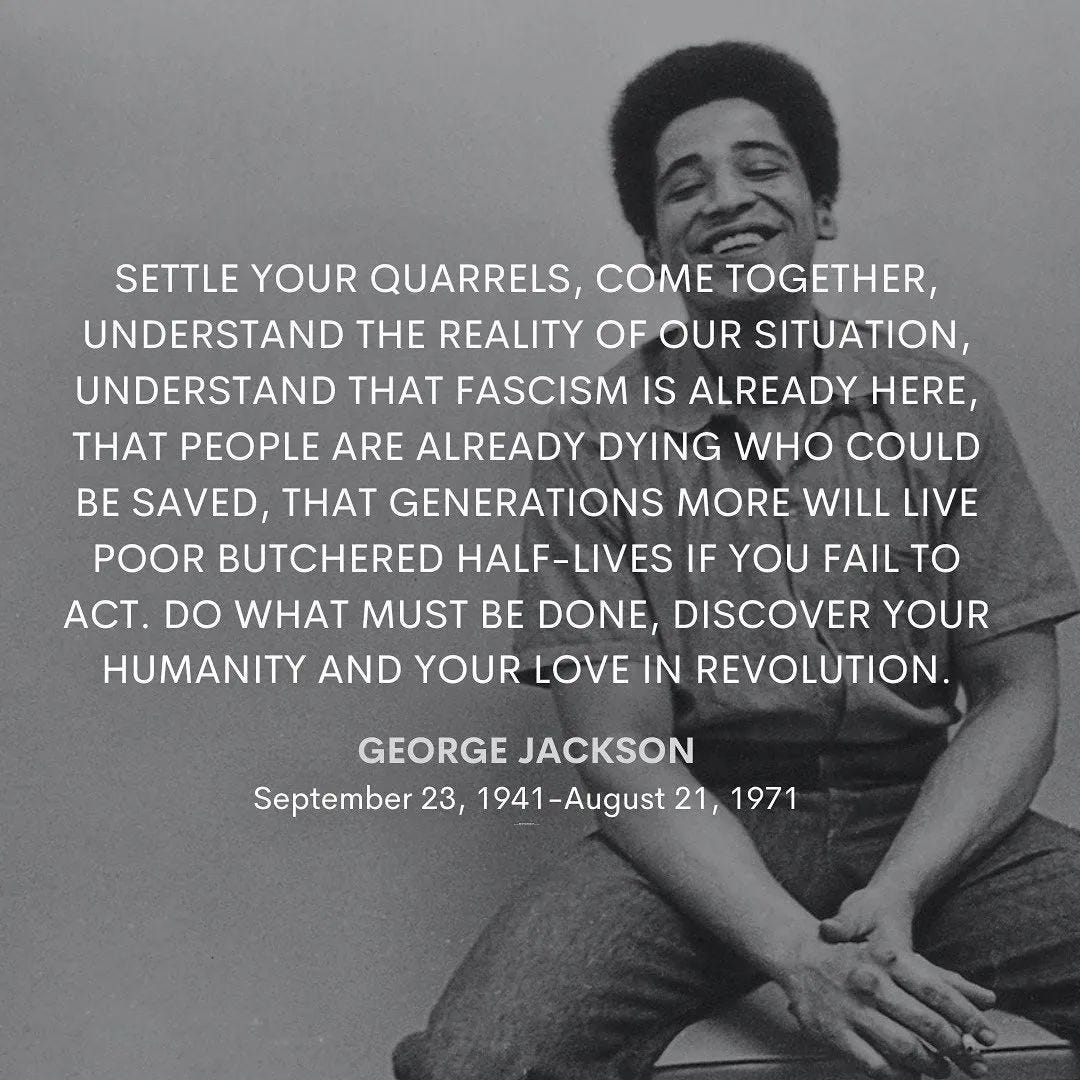



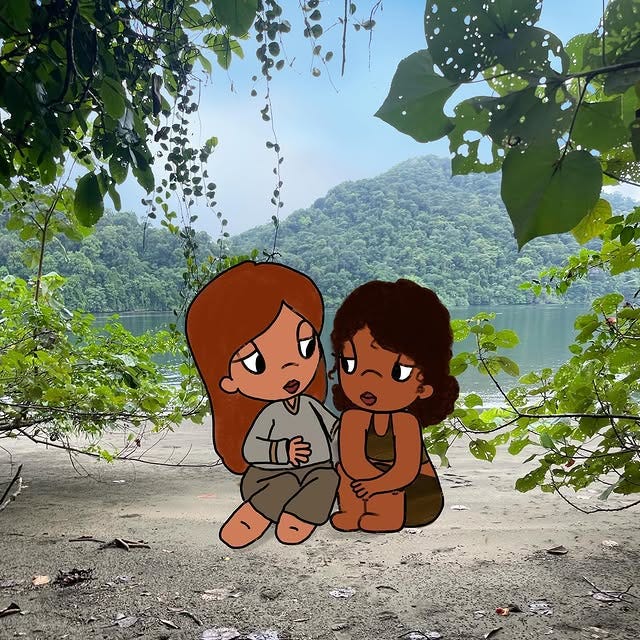
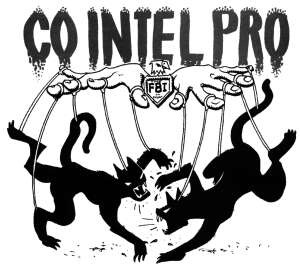



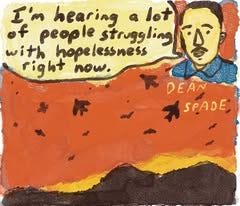



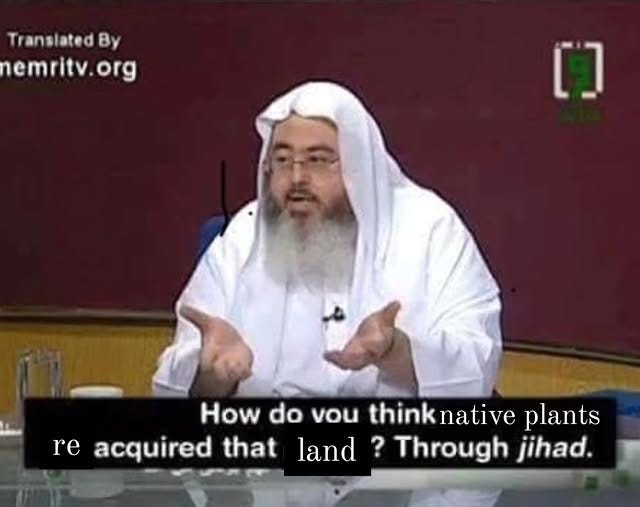
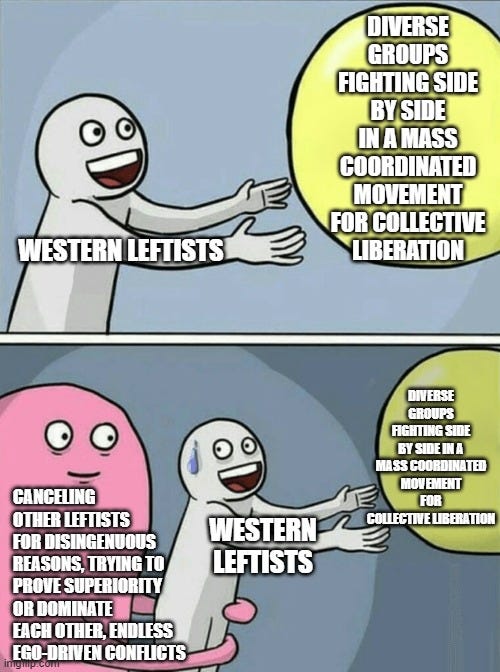
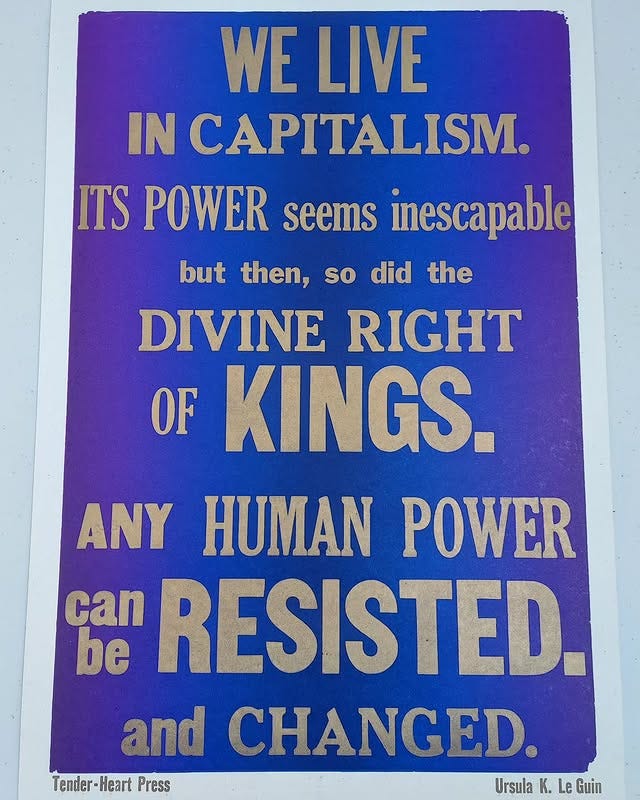

Thank you for this piece. I find that in addition to becoming more skilled at relational communication, a lot of folks could benefit from tapping into spiritual practices that are focused on dissolving the hard edges of one's ego. I've witnessed folks (myself included) often co-opt good causes to excuse unskillful behavior ultimately based in the ego's need for satisfaction. It takes a lot of courage, discernment, and skillfulness (held by a foundation of love and trust) to compassionately call each other in when this happens in our organizing spaces.
Oh, my, wow, this is so timely. Dealing with this in our local leftist spaces, currently. Thank you, dear liberator.🙏🏼